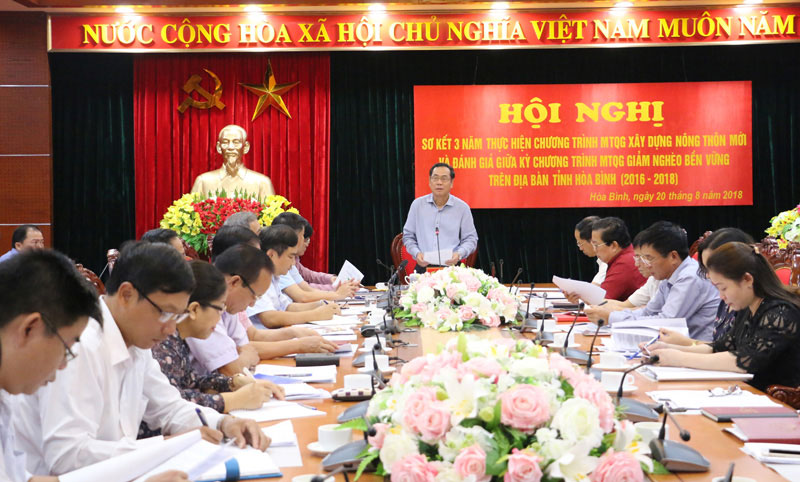


Deputy Secretary of the provincial Party Committee and Chairman of
the People’s Committee Nguyen Van Quang presided over the conference.

Vice Secretary of the provincial
Party Committee and Chairman of the People’s Committee Nguyen Van Quang
delivers a speech to conclude the event.
During the implementation of the national target programme on
new-style rural area building in 2016-2018, the province fulfilled more than 65
percent of the criteria and tasks which were assigned by the Prime Minister
until 2020, despite a range of challenges. All communes have met at least seven
criteria of the programme and Hoa Binh city is expected to receive the status
of new-style rural area this year.
This was attributable to the efforts of party committees, administrations
and Fatherland Front Committees at all levels, along with all organisations
from provincial to grass-root levels and local people.
Total financial sources to carry out the target programme on
new-style rural area building in three years reached about 6,654 billion VND (293
million USD). As a result, infrastructure has been upgraded, giving a facelift
to rural areas.
Many production models prove to be effective, generating high
income for local people. Per capita income in Hoa Binh’s rural areas in 2018 was
estimated at 24.8 million VND (1,063 USD). To date, 51 communes of the province
have been recognised as new-style rural areas, equivalent to 67 percent of the
plan. Each commune has fulfilled an average of 12.62 of the total criteria, or
85 percent of the plan.
The national target programme on sustainable poverty reduction
also saw positive outcomes, as infrastructure in disadvantaged regions has been
built. Policies on poverty alleviation have been promptly carried out, which improve
people’s welfare and access to social services.
Therefore, in late 2017, the province’s poor household rate dropped
to 18 percent, (38,293 families). The figure sees an annual decrease of 3.19
percent, meeting the target.
In late 2018, the rate is expected to fall 14.9 percent, down 3.1
percent year-on-year and 9.48 percent against the same period of 2016,
representing a annual decline of 3.16 percent./.